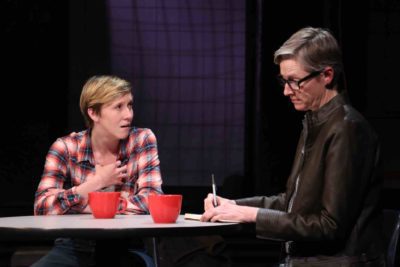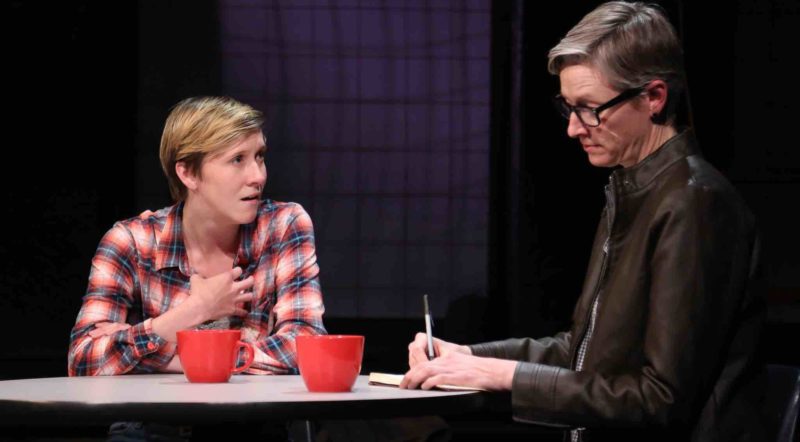INTERVIEW: Oil tragedy spills onto Ensemble Studio Theatre’s stage in NYC

The events of the 2010 British Petroleum oil spill in the Gulf of Mexico might not immediately jump out as a typical topic for the theatrical stage, but Ensemble Studio Theatre is no typical theater company. The tragedy of the Deepwater Horizon oil rig, which resulted in the death of 11 workers and was the largest oil spill in history, led to millions of gallons of the black liquid flowing off the coast of Louisiana.
SPILL, which runs at EST through April 2, is the passion project of writer/director Leigh Fondakowski and a dedicated ensemble that includes Kelli Simpkins as the narrator.
“I had been working with Leigh Fondakowski, who is the writer and director of this piece, of SPILL, for 17 years now, so I have done four productions with her thus far,” Simpkins said recently in a phone interview. “We have been working on SPILL for five years now. I have been involved since 2011. Leigh became involved a little bit before that, and as she was slowly progressing in the initial phases of this, she asked me if I wanted to come aboard and be a dramaturge and performer for the piece.”
The play is based on 200 hours of interviews collected after the spill, and it attempts to put a human face on the environmental disaster. Simpkins plays the narrator of the theatrical piece, a character who is a facsimile for Fondakowski herself.
“She is present, doesn’t say a lot, and it’s not really about necessarily what she’s thinking or what her opinions are about what’s happening,” Simpkins said. “She is the conduit through which the audience experiences the piece, and then in many moments, because I’m playing other characters, the narrator kind of falls away or has a physical presence but doesn’t have a presence that is about her speaking or about her commenting on the action. She’s writing in a notebook. She’s going along to all these different communities, and I hope it’s clear to the audience that she’s the one who is collecting stories in the aftermath of the spill and really deeply digging into this oil industry, the fishing communities, the parents and family members who lost their loved ones onboard the Deepwater Horizon. She is the one who is kind of unearthing all these stories and all these people to interview, so that’s kind of the role that is centralizing, organizing part of the piece.”
There was some hesitation at the early stages of SPILL’s development because it’s hard work to relive a tragic situation over and over again. The emotions can be difficult, especially when documenting communities that are grieving and grappling with loss.
“I know that [Fondakowski] went down there with an initial group of students to really talk about how do you interview and how do you try to begin making pieces out of this, and then she saw some dolphins being autopsied as they were taking a tour down to the different beaches,” Simpkins said. “I think, for me, the never-ending discovery and curiosity and love for work like this is [because of] the actual human lives that are represented.”
Simpkins said that initially many people lived with this oil spill as a small image at the bottom of a news screen on their TV, and day in and day out, the news became more dire. “You were watching and kind of wondering what was going to happen because all of that oil was obviously being spewed into the gulf,” she said. “What was happening to the wildlife? What was going to happen in terms of long-reaching effects both in terms of the land, the people who were near it, the oil industry itself? But I get hooked in, and I hope the audience gets hooked in.”
The first act of the play deals with the actual explosion of the Deepwater Horizon, an event that was dramatized in a recent film starring Mark Wahlberg and Kurt Russell. The second act digs deeper into the communities that are in mourning.
“Our explosion is much simpler, I think, but is much more poetic and is deeply present and intimate in terms of what we’re exploring theatrically on stage every night,” Simpkins said. “So the story draws me in, and the characters draw me in. And that’s why I get very moved by this, particularly many of these characters that you see in SPILL. On stage are people that the media does not find, did not find and oftentimes does not want to hear more than a few minutes from, and Leigh sat down with many of these people … and interviewed them on multiple occasions. I think you really get a cross-section or a vision of Americana at a particular point in history at a very particular time.”
Simpkins sees her mission as a performer is displaying that sense of discovery about the material at every performance. No matter if it is the fifth time or 40th time performing the play, it’s up to EST to bring urgency to the narrative for an audience that is likely experience this theatrical tale for the first time.
“It’s pretty hard work for an actor to always be engaged,” she said. “I mean, sometimes you go into one of those modes that feels a little robotic, that you’re just going through the motions because it’s in your muscle memory, and you’ve said it so many times. And I think that is, for me in particular as an actor, the thing that I’m trying to fight against every night. Like, how do you warm up, and how do you get your body ready? And how do you mentally and emotionally prepare to tell a story like this? Because it’s pretty epic.”
By John Soltes / Publisher / John@HollywoodSoapbox.com
SPILL is currently playing the Ensemble Studio Theatre in Midtown Manhattan through April 2. Click here for more information and tickets.

